Let My People Go
The Jewish holiday Passover is the eight-day observance of the
Israelites’ breaking the bonds of Egyptian slavery and their
ensuing exodus from the tyrannical Pharaoh Ramses II. As the story
goes, Moses was instructed by God to demand freedom for the
Israelites. The name Passover (or Pesach, which means passing over
or protection) actually comes from one of God’s instructions to
Moses. In order to persuade Pharaoh to release his slaves, God
intended to kill the first-born of both humans and beast; to
protect themselves, the Israelites were instructed to score lamb’s
blood on their dwellings, so that God would pass them over.
Pharaoh adamantly refused Moses’ plea to “Let my people go,” so
God unleashed 10 deadly plagues on the Egyptian people, and after
the last one, Pharaoh agreed to set free his slaves. As the
Israelites fled, Pharaoh sent his army to chase after them, through
the desert and toward the Red Sea. But the army was quashed when
Moses performed a miracle and parted the Red Sea for the
Israelites. Once they were all safely across, they watched as the
gap closed up and washed away the Egyptian army.
In commemoration of this amazing event, Jews today convene at
home and conduct a seder, during which the entire Passover story is
told. The seder is only performed on the first or second night of
the holiday. Different foods are used to symbolize the Israelites’
suffering and eventual freedom. For example, matzah, or unleavened
bread, is representative of the fact that the Jews did not have
time to finish baking their bread before they had to flee. They
took the unleavened dough on their journey and baked it in the sun.
This is just part of the symbolism associated with perhaps the most
important holiday in the Jewish religion.



